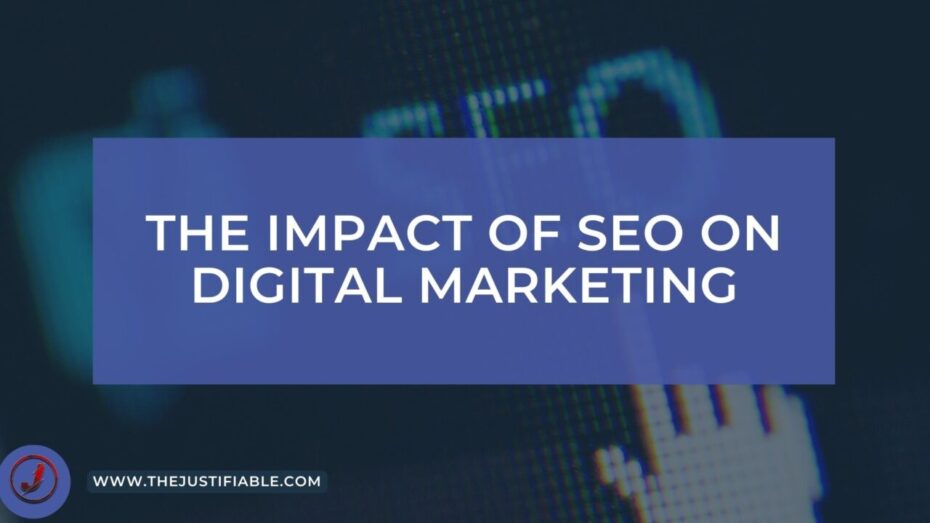Table of Contents
The impact of SEO – One of the key components of a successful digital marketing strategy is search engine optimization (SEO). SEO involves optimizing your website and content to rank higher in search engine results pages (SERPs).
When done correctly, SEO can have a significant impact on your digital marketing efforts, leading to increased traffic, higher conversion rates, and improved brand visibility. In this article, we will discuss the importance of SEO in digital marketing and how it can help boost your overall strategy.
What is SEO?
Search engine optimization (SEO) is the practice of improving the quantity and quality of traffic to a website from search engines through organic search results. In simple terms, it involves optimizing your website and its content to rank higher in search engine results pages (SERPs).
This is done by identifying the keywords and phrases that potential customers use when searching for your products or services and then optimizing your website and content to target those keywords and phrases.
There are two main types of SEO: on-page and off-page. On-page SEO refers to optimizing the content and structure of your website, including things like title tags, meta descriptions, headers, and content.
Off-page SEO refers to the activities that take place outside of your website to improve its visibility, such as link building, social media marketing, and content marketing.
The Importance of SEO in Digital Marketing
SEO is an important part of any digital marketing strategy. Here are some of the ways in which SEO can have a significant impact on your digital marketing efforts:
Increased Visibility and Traffic
One of the main benefits of SEO is that it can increase your website’s visibility and traffic. When you optimize your website and content for relevant keywords and phrases, you increase the likelihood that your website will appear in search engine results pages (SERPs) when people search for those keywords and phrases. This, in turn, can lead to increased traffic to your website.
Improved User Experience
SEO is not just about optimizing your website for search engines; it is also about optimizing your website for users. When you optimize your website and content for relevant keywords and phrases, you are also making it easier for users to find the information they are looking for. This can improve the user experience and lead to increased engagement and conversion rates.
Higher Conversion Rates
Another benefit of SEO is that it can lead to higher conversion rates. When you optimize your website and content for relevant keywords and phrases, you are targeting people who are actively searching for your products or services.
This makes them more likely to convert into customers. In fact, research has shown that organic search traffic has a higher conversion rate than other forms of traffic.
Improved Brand Visibility and Credibility
SEO can also help improve your brand visibility and credibility. When your website appears at the top of search engine results pages (SERPs), it signals to users that your website is a relevant and trustworthy source of information. This can help improve your brand’s reputation and credibility, leading to increased trust and loyalty from customers.
How to Implement SEO in Your Digital Marketing Strategy
Now that we have discussed the importance of SEO in digital marketing, let’s take a look at some of the key steps involved in implementing SEO in your digital marketing strategy:
Keyword Research
The first step in implementing SEO is to conduct keyword research. This involves identifying the keywords and phrases that potential customers use when searching for your products or services.
There are a variety of tools that can help you with keyword research, including Google Keyword Planner, SEMrush, and Ahrefs.
On-Page Optimization
Once you have identified your target keywords and phrases, the next step is to optimize your website and content for those keywords and phrases. On-page optimization refers to the process of optimizing the content and structure of your website to improve its visibility and relevance for search engines. Here are some key areas to focus on when implementing on-page optimization:
Title Tags and Meta Descriptions
Title tags and meta descriptions are HTML elements that appear in search engine results pages (SERPs). They provide a brief summary of what your website or page is about and can have a significant impact on click-through rates (CTRs).
When optimizing your title tags and meta descriptions, make sure to include your target keywords and phrases in a way that accurately reflects the content of your website or page.
Header Tags
Header tags (H1, H2, H3, etc.) are HTML elements that are used to structure the content of your website. They help search engines understand the hierarchy and importance of the different sections of your website.
When optimizing your header tags, make sure to include your target keywords and phrases in a way that accurately reflects the content of your website.
Content Optimization
Content optimization involves optimizing the actual content of your website for your target keywords and phrases. This includes things like including your keywords in the body of your content, using synonyms and related terms, and ensuring that your content is high-quality and relevant to your target audience.
URL Structure
URL structure is an important factor in on-page optimization. When optimizing your URLs, make sure to include your target keywords and phrases in a way that accurately reflects the content of your website or page. This can help improve the relevance and visibility of your website in search engine results pages (SERPs).
Off-Page Optimization
Off-page optimization refers to the activities that take place outside of your website to improve its visibility and relevance for search engines. Here are some key areas to focus on when implementing off-page optimization:
Link Building
Link building involves acquiring backlinks (links from other websites to your website) in order to improve your website’s authority and relevance for search engines. When implementing a link building strategy, focus on acquiring high-quality backlinks from relevant and authoritative websites.
Social Media Marketing
Social media marketing involves using social media platforms to promote your website and content. When implementing a social media marketing strategy, focus on creating high-quality, engaging content that encourages social sharing and engagement.
Content Marketing
Content marketing involves creating and promoting high-quality, informative content in order to attract and engage your target audience. When implementing a content marketing strategy, focus on creating content that is relevant to your target audience and that provides value in terms of information or entertainment.
Measuring the Impact of SEO on Digital Marketing
Measuring the impact of SEO on digital marketing is crucial in order to determine the effectiveness of your SEO efforts and make adjustments as needed. Here are some key metrics to track when measuring the impact of SEO on digital marketing:
Organic Search Traffic
Organic search traffic refers to the traffic that comes to your website through search engine results pages (SERPs). Tracking organic search traffic can help you determine whether your SEO efforts are leading to increased visibility and traffic.
Conversion Rates
Conversion rates refer to the percentage of website visitors who take a desired action, such as making a purchase or filling out a contact form. Tracking conversion rates can help you determine whether your SEO efforts are leading to increased engagement and conversion rates.
Keyword Rankings
Keyword rankings refer to the position of your website or page in search engine results pages (SERPs) for specific keywords and phrases. Tracking keyword rankings can help you determine whether your SEO efforts are leading to improved visibility and relevance for your target keywords and phrases.
Ending
SEO is a critical component of any digital marketing strategy. By optimizing your website and content for relevant keywords and phrases, you can improve your visibility and relevance for search engines, attract more organic traffic, and ultimately increase engagement and conversion rates.
The impact of SEO on digital marketing is multifaceted, encompassing both on-page and off-page optimization strategies. On-page optimization involves optimizing the content and structure of your website, including title tags, header tags, content optimization, and URL structure.
Off-page optimization involves activities outside of your website, such as link building, social media marketing, and content marketing. Measuring the impact of SEO on digital marketing is crucial in order to determine the effectiveness of your efforts and make adjustments as needed.
By tracking metrics such as organic search traffic, conversion rates, and keyword rankings, you can gain insights into the success of your SEO efforts and make data-driven decisions.
To summarize, SEO is a continuous process that necessitates consistent effort and attention. You can improve your website’s visibility and relevance for search engines, attract more organic traffic, and ultimately achieve your digital marketing goals by implementing effective SEO strategies and measuring their impact.






